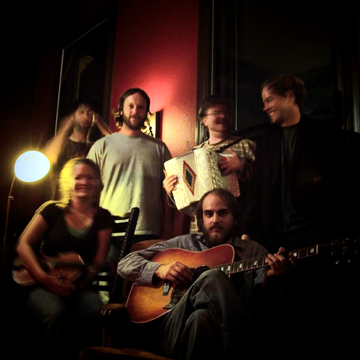 Telegraph Canyon’s rehearsals aren’t about ‘making noise’ but carefully placing musical elements into specific spots.
Telegraph Canyon’s rehearsals aren’t about ‘making noise’ but carefully placing musical elements into specific spots.
|
| Telegraph Canyon\r\nTomorrow (Thu) w/Macon Greyson and The Always Ready at The Cavern 1924 Greenville Ave, Dallas. $6. 214-828-1914. |
|
A D V E R T I S E M E N T
|
|
|
|
A D V E R T I S E M E N T
|
|
Old New World
Telegraph Canyon mines the past for new, novel sounds on All the Good News.
By CAROLINE COLLIER
Even though he’s an easy-going guy, Telegraph Canyon’s Chris Johnson has some serious convictions. Last spring, he traveled to Washington, D.C., to take part in an anti-war protest. When uniformed federal “peacekeepers” drew a line on the White House lawn, he calmly walked across it. He was arrested, but he felt he’d made a point.
Maybe not so ironically, a few months later, Johnson and musicians he’d carefully selected to form Telegraph Canyon found themselves recording their debut album, All the Good News, in a studio in McGregor, a short distance from the President’s Crawford bunker. Guitarist Erik Wolfe recalls that if you were driving through Crawford and took a wrong turn, “you’d find a guy with a machine gun.” Never assuming the role of political prophet, Johnson nonetheless creates music that he describes as socially conscious. “The record is political in some ways,” he said. “It’s there if you want to gather it. You can’t make art without your environment affecting you, and we live in a chaotic world.”
Johnson’s perspective on military and musical matters was developed by stints in the Army and a Missouri gospel band. A lifelong songwriter, he began to hone his craft while touring with the group. Upon returning to his hometown of Fort Worth a few years ago, he got to work putting a band together. After his first outfit, Eddie Bang, Johnson recruited new bandmates, created new material, and changed the name to the now-defunct Delfi. Just as their debut disc was about to be released, the band members went their separate ways.
Just prior to Delfi’s crash, Johnson joined a friend of his, drummer Lucas White (Confusatron, Top Secret, Solomonic), on a trip to pick up a van in California. The two used the open space and ample time to hold deep discussions about the nature of music and how best to express it. The experience left an impression on Johnson, who wanted to “embrace the Southwestern vibe, maybe use accordion and violin.” When the two travelers passed through Telegraph Canyon, an area near San Diego, everything gelled into a completed vision, and the new band was born.
Along with White, Johnson got bassist Chuck Brown (Solomonic), guitarist Andrew Skates (Confusatron, Caffeine Chemistry, Barber Mack), and violinist Tamara Cauble, who had recently picked up music again after a long break. Not satisfied with the core of sounds, Johnson placed an ad on DallasMusician.com for an ambient guitar player. UNT jazz student Wolfe responded the moment he saw that Johnson had listed The Flaming Lips and Wilco as influences. He auditioned and fit the format perfectly, solidifying the layers of textures and harmonies that Johnson had envisioned.
With almost everyone in Telegraph Canyon splitting time among various projects and listening to all types of different music, you’d expect a hodgepodge of sound. But, as Wolfe said, “Everyone can play their instruments really well, but it’s about restraint. Sometimes two notes sound great as compared to 100.”
Skates added: “I’m used to jamming, making stuff up, but in Telegraph Canyon, I sit back and craft.” In what Johnson describes as a “very deliberate process,” rehearsals are not about making noise but about carefully placing musical elements into specific spots.
It takes work, Wolfe said, “to keep the violin and electric guitar from drowning each other out. Our music is more complex than simplistic, even though it may not come off that way.”
After months of working to become tighter, the members of Telegraph Canyon discussed how to proceed with recording their as-yet-unnamed album. Steven Collins, the mastermind behind local ambient-folk duo Deadman, had recently set up a big, atmospheric room in McGregor. Collins was chosen for the job because, Johnson said, he was “into ambient building of the songs.” Johnson believes their approaches are similar. “He’s open-minded about folk music with progressive sounds.”
The album was recorded in six 12-hour sessions. The Deadman/Telegraph Canyon vibe couldn’t have worked any better, in Skates’ opinion. Collins “is good at figuring out how you want it to sound in your head.”
Even though the group has been together for only about a year, there are big possibilities ahead, starting with a tour. “We have a clear direction,” Johnson said. “We come together over a central feeling. The songs are a meeting of the old world and new.”
 Email this Article...
Email this Article...

